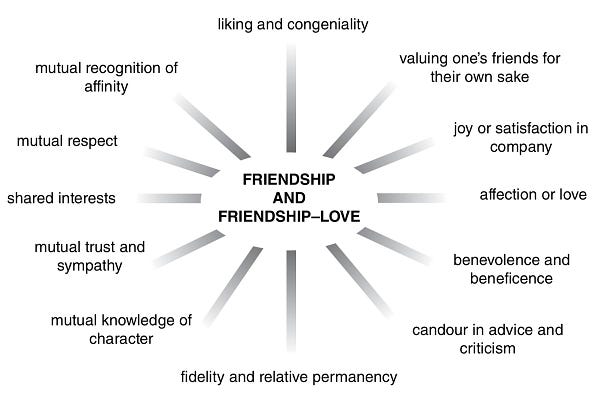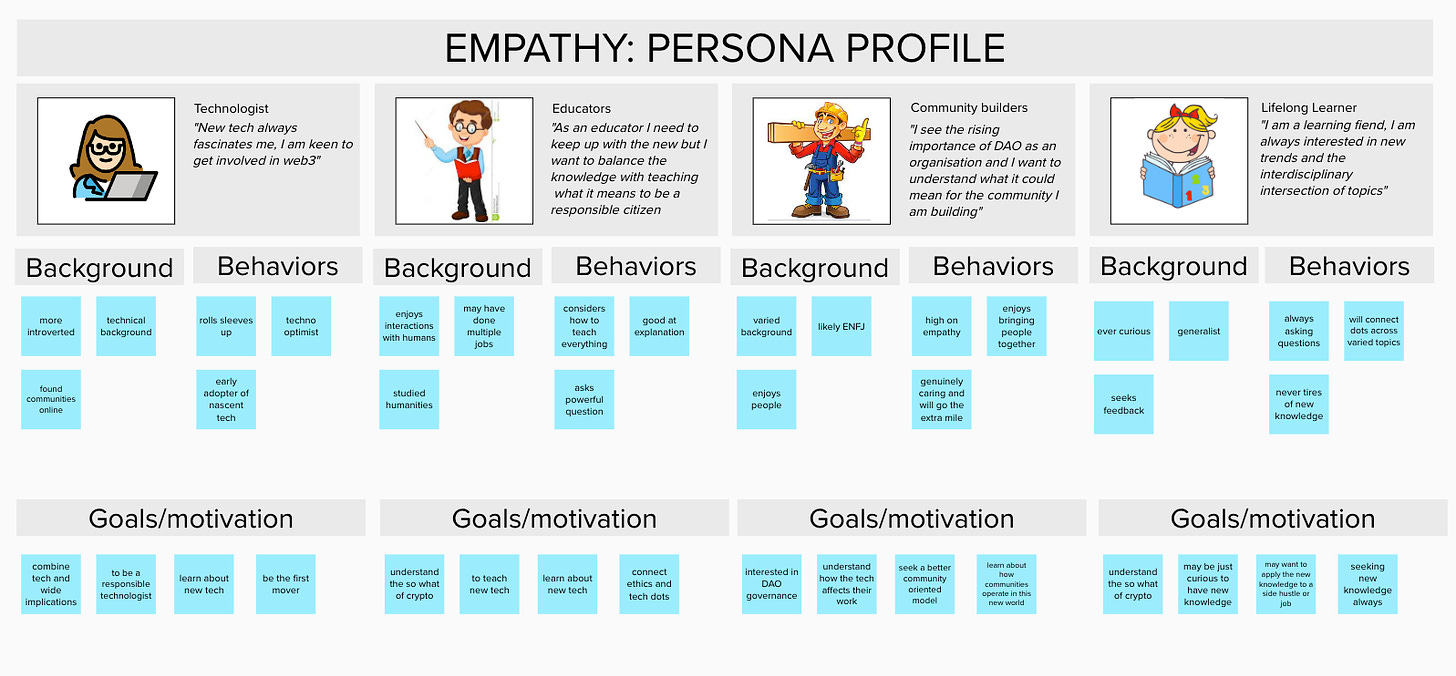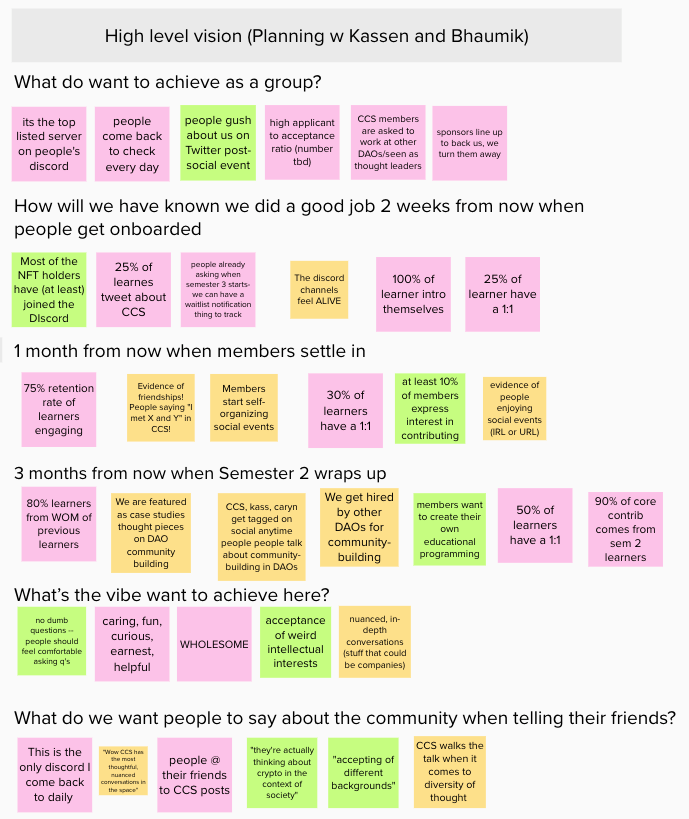Interviewing to be a DAO community leader
What to look for when considering whether to join a DAO as their community lead
When Crypto Culture Society (CCS) tweeted that they were looking for a community builder for semester II, a friend of mine tagged me in it. CCS is a learning DAO building liberal arts education for crypto, which started as a tweet and became a crowdfund.


Life is interdisciplinary while our education has a tendency to be siloed. As technology permeates more of our lives, designing them without the consideration of multiple disciplines can lead to myopia and tunnel vision. The consequences of that may be technology that society does not adopt well or worse, one that benefits only a small few and causes greater disparity amongst everyone else. And because liberal arts is a confluence of multiple disciplines, CCS is a DAO that attracts a broad variety of learners.
CCS operates in twelve week long semesters with leading builders, thinkers and investors in crypto lecturing students on a variety of topics. Learners have the option to come together in a synchronous ‘after party’ on Zoom to discuss the lectures and also have a digital campus on Discord to continue those discussions in their own time.
Building an interdisciplinary community of thinkers and tinkerers critiquing the role that tech plays in society is not new to me. In my previous career, I built one of the first teams serving industry on the topic of AI ethics. I developed and cultivated a global remote team of interdisciplinary practitioners across lawyers, data scientists, business strategists, designers and ethicists. Our focus was on governing and auditing algorithmic decision making so we could mitigate bias and prevent exacerbation of systemic inequalities. I had also been lecturing undergraduates, corporates and continued education on tech and society.
I know through my own experience that it is always easier to embark on an unknown path if you can relate to the people who have been there and done that. For that reason, I am sharing my interview experience. I want this step-by-step breakdown to make pathways into web3 more accessible especially for women of colour.
Interview Preparation
In CCS, we think of the role of a community builder as creating space for connection amongst learners such that they would eventually become the type of friends who felt close enough to invite each other to their respective weddings.
I began strategizing on how to make this happen prior to my first interview. I created a living document with a strategic plan for my interview. It is a living document that I still refer to and regularly iterate upon as I gain new insight.
The job description and interview gave me a good peek into how the DAO thought about community, which is summarised in this image:
It was also a great opportunity to see whether my vision for the notion of community aligned with theirs. For me, community is about a group of people with shared values and interests coming together in a psychologically safe space that provides for connection, belonging and learning. The best communities transcend these into innovating and building great ideas together. Like any good interview, we were able to see whether my skills and mindset fit. And crucially whether I liked their vibes and vice versa!
The original description is here if you want to read the details. Interested applicants were given six questions and we had to answer at least two of them. I answered four out of six. The candidates who were shortlisted went on to do two 1:1 interviews with the other community lead and the strategy lead of the DAO.
Answering interview questions
1. What principles would guide your approach towards designing online communities / online interactions? What are some dos & don’ts?
My guiding principles:
Empathy: Understanding who the members of the community are and their needs by creating persona profiles which provides an informed summary of the backgrounds, behaviours and goal (living document)
Safety: Creating an experience journey showing stages, actions, vibes and measurable metrics as they discover, onboard and become an active, supportive and eventual leader of the community (living document)
Curiosity: Be quick to leverage the excitement and energy at discovery and onboarding to create small group feels even in a big town hall - say hi to newcomers, encourage them to make an intro in the first week, match new people to new friends to retain stickiness
My Do's
Make sure the onboarding is super awesome
Set ground rules and be vocal about things that are not tolerated
Address different stages of being in an online community differently
Ask community for feedback regularly
Make the most of their excitement at the early stages
My Don't's
Leave a new member's comment unanswered
Assume you know what everyone wants and needs
Treat each stage of being in the community the same
The main part of my answer came in a digital brainstorming board where I showed my thinking behind how we can cater for the entire community by not expecting nor forcing a one-size-fits-all approach.
I split the community into four personas and showed their journeys:
The personas could be split along other axes too like students, full-time workers, parents with full-time jobs etc. But the main thing was to start with a hypothesis of what is believed to be the most true given the facts at that point and then put it out into the wild to test.
CCS had described themselves as attracting technologists, educators, community builders and lifelong learners so my users were grounded in those personas.
Click here to check out the board.
2. How would you facilitate meaningful social connections between new members?
Encourage everyone to introduce themselves and when they have, ask the newest person to reach out to the two intros above them to have a call - only after they have done the calls can they access a certain channel (logistics of latter needs to be figured out future)
Appoint ambassadors who connect new joiners with other members
Appoint contributors whose metrics is to encourage as many meaningful 1:1
Run onboarding sessions for new joiners every month or two weeks and use breakout rooms to encourage new friendships to form
Use matchmaking tools like scale.ai
Create sub groups and encourage them to meet up
3. How would you design experiments for new social events? Share specific examples of events, how you’d think about success, and how you’d plan them
Every social event or engagement can be classed into one of these categories (h/t Carrie Melissa Jones). Note that they are not mutually exclusive, some events can be two categories at once e.g. education and welcome. Also note that these can be run online and in person, my answers focus on the URL experiences as that has greater reach..
I would work with the CCS team to align in direction and then test out the following events, initially low fidelity to test whether they progress the community’s metrics. Seven categories of events:
Educational - do something better and grow into what the community aspires to be e.g. lecture on ethics of crypto
Town halls - e.g. town hall on formation, change, value, vision
Debate - debate hot topics that may cause division. This enables identity clarification and dialogue, it may also mean that some members realise it is not their community and will leave e.g. the positive and negatives of crypto on society, its implications on climate etc
Recognition - celebrating individual and group milestones within the community e.g. end of semester, selling out of NFTs, core members arriving and leaving
Socials and friendship - enable greater connection between members by creating small rooms and 1:1 spaces e.g. mentoring, dinners, coffees
Onboarding and welcome - important ritual for bringing new people into the space as well as integrating old and new members e.g. onboarding calls
This question and the one above ties back to the personal map and experience journey map. We have to first understand what the strategy for the community is and what we are striving for. In CCS’s case, the strategy is to be a world class educational institution on web3.
Off the back of that we will create meaningful engagement metrics, not just random events for the sake of random events. It specifically ties back to the question of whether we are boosting the metrics and making progress in the right direction.
In the community team the metrics we measured ourselves against was how many people were posting about CCS on Twitter and showing their gratitude or enjoyment of the DAO in our Discord. And how often that was happening. We wanted to see the quality and quantity of love, appreciation and enjoyment CCS was getting as a DAO.
4. What specific changes would you make to the CCS discord server to contribute towards the goals of this role?
I would change the intro channel to provide a bit more structure and make it easier to find people using the following:
👋🏽 About me
💻 What I am currently working on
🙋🏻♀️ How I can help/what I am experienced in
🛹 Fun facts
🏠 Digital home
I would create a weekly roundup thread. I would create opt in sub groups. It could also be nice to create international areas so that people don’t feel that speaking English is a barrier to taking part in the space.
Community Team Brainstorm
As a team we brainstormed a high level vision for the community. We looked at the persona and journey then we answered some questions in light of that.
These were questions posed by our DAO’s main instigator, Bhaumik:
What do we want to achieve as a group?
How will we know we did a good job 2 weeks from now when learners get onboarded?
One month from now when learners settle in?
Three months from now when semester II wraps up?
What is the vibe we want to achieve here?
What do we want people to say about the community when telling their friends?
We brainstormed answers to those questions with set times, clustered them into groups, categorised those groups and with that in mind planned the activities for the entire semester.
Up Next
Next time I will share details about the pre-season preparation, which included creating questions for the application form, building the learner handbook, planning the onboarding synchronous call and presentation.
In the future, expect deep dives into other elements of pre-semester prep, orientation week, enabling learners to contribute, seeking feedback from the community and team operations in a DAO.
Keen to swap notes and hear feedback especially from others working as community builders in DAOs. If you want a sparring partner, please reach out!







